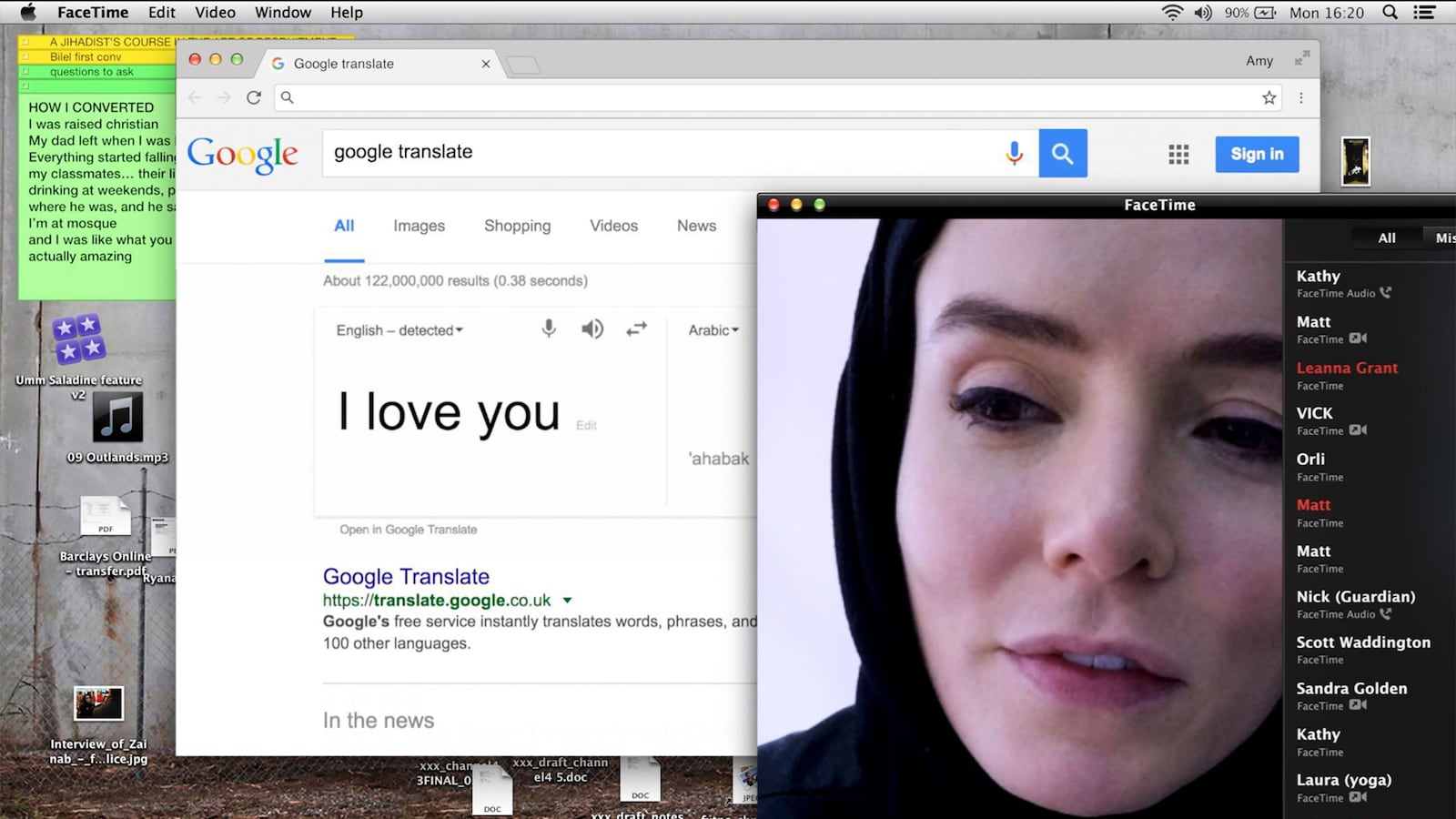BERLIN, Germany — “Based on a true story” is perhaps the most ridiculous tagline in the history of movies. Borrowing an actual historical or biographical incident for the purposes of fiction justifies all manner of fakery, manipulation, and sensationalism.
Such is the case with Timur Bekmambetov’s Profile, a gimmicky adaptation of a book inspired by a gimmicky piece of investigative journalism. Bekmambetov takes his inspiration from French journalist Anna Érelle’s In the Skin of a Jihadist, a breathless account of a woman impersonating a lonely Muslim convert online in order to explore the curious phenomenon of European and American girls recruited by ISIS through social media. The movie’s primary selling point is its supposedly “immersive” interactive quality. Like the 2015 horror movie Unfriended (which was produced by Bekmambetov), Profile takes place entirely within the online realm of a computer screen; the characters’ emotional arcs are fueled by their input into, and reaction to, Facebook messaging and Skype calls.
At a Q&A with the cast and crew at Sunday’s premiere of the film at the Berlin Film Festival, the moderator gushed about how these films exemplify a “totally new cinematic art form.” Still, while Bekmambetov readily agreed, Profile’s interactive gimmickry ably demonstrates that clichés embedded in movies from the earliest days of the cinema can easily weather the wizardry of the most up-to-date technologies.
Bekmambetov and co-screenwriters Olga Kharina and Brittany Poulton anglicize Érelle’s saga by transforming the Paris-based journo into a British freelancer named Amy Whittaker (Valene Kane) trying to make ends meet in London. Dealing with the demands of her neurotic fiancé Matt, (Morgan Watkins) and her persistent editor Vick (Christine Adams), the head of a Vice-like website, keeps her busy. Desperate to pitch a lucrative idea, Amy eagerly impersonates a naïve teenager striving to become a jihadist by ensnaring a hot fundamentalist boyfriend via a fake Facebook page. Assuming the nom de screen of Melody Nelson, she, within minutes, attracts the roving online eye of Abu Bilel (Shazad Latif), a British-born man of Pakistani heritage fighting for ISIS in Syria.
With only screen shots as visual ornamentation, Bekmambetov is able to create a certain amount of narrative tension. Amy’s furious attempts to alternate between a ruse that threatens to endanger her life and the needling she receives from both her editor and boyfriend result in farcical Skype exchanges that leave her frazzled. When her masquerade seems to be going in a disastrous direction, Amy appears to be on the verge of a serious nervous breakdown—thereby giving Kane an opportune moment to demonstrate her acting chops.
Despite its phony veneer of social awareness (as if the director of Abraham Lincoln: Vampire Hunter could give two hoots about concrete political or social problems), Profile is in a long lineage of films in which “exotic” Middle Eastern protagonists seduce and violate Western women. To be sure, Amy/Melody starts out as the putative seducer. But, during the course of her digital relationship with Abu Bilel, she gradually begins to be consumed with the role she is playing and appears to experience a temporary bout of Stockholm syndrome. Despite her exasperation with donning a hijab, she tentatively falls in love with her nemesis.
This disconnect resembles the decidedly mixed emotions that Lady Diana Mayo grapples with as she ponders both the charm and sadism evinced by Rudolph Valentino’s master seducer in George Melford’s 1921 silent film The Sheik. Instead of being merely another cautionary tale about the lure of ISIS, the film recreates an age-old scenario in which a representative of white womanhood is besieged by the sexual potency of the “mysterious” East. It’s to the credit of Shazad Latif that he manages to create a nuanced character out of a stereotype.
Although the plight of young women who have been recruited by ISIS is certainly heartbreaking for their families, this failed experiment in cultural appropriation seems relatively minuscule compared to the vast number of young men and women who have been attracted to white supremacist hate groups in recent years. Several years ago, a French film called Heaven Will Wait took on the subject of teen girl jihadism and came off as a little more than an anemic tearjerker. But the subject is evidently so titillating for producers that there will doubtless be more attempts to exploit its appeal. It’s so much easier to concoct a tale about a noxious, but handsome, predator than to focus on the origins of ISIS, a group that, from all accounts, stemmed from the consequences of the United States’ failed invasion and occupation of Iraq.






